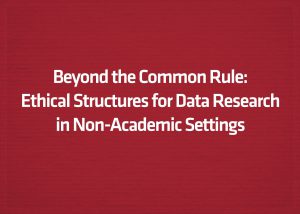Commissioner Brill and the Broader Privacy Call to Arms
Wednesday, in a speech at the Polytechnic Institute of New York University, FTC Commissioner Julie Brill addressed an audience of engineers and computer scientists and solicited their skills to improve consumer privacy and enhance trust. Her specific concerns have tracked some of the biggest debates I have seen during my time at the Future of Privacy Forum. Brill identified the challenges facing the Fair Credit Reporting Act (FCRA), the rise of the Internet of Things, and opacity of data brokers as three of “the most vexing privacy problems presented by big data.”
Her concerns about the FCRA in many respects echo the worries Professor Chris Hoofnagle discussed with me and detailed in an essay on the law in advance of FPF’s “Big Data and Privacy” conference last month. Further, Brill notes that the Internet of Things will provide “a ready canvas” that provides “a new way of giving notice and consent that is more meaningful and less confusing for users.” FPF agrees and argues similarly that the flexibility inherent in the Internet of Things will benefit consumers.
Yet Brill seems most worried about the vast amounts of data collection and user profiling occurring by entities that are not consumer facing. “What damage is done to our sense of privacy and autonomy in a society in which information about some of the most sensitive aspects of our lives is available for analysts to examine without our knowledge or consent, and for anyone to buy if they are willing to pay the going price?” Brill asked.
While so-called data brokers have become something like the bogeymen of the Big Data world, much of this is likely simply due to consumers having little understanding of what it is these companies do. In the past, FPF has called for companies to work toward “featurizing” data in ways “share the wealth” directly with consumers. Simply sharing the data that gets collected about consumers with consumers could go a long way to demystifying what is happening.
Commissioner Brill’s “Reclaim Your Name” is a big step toward shedding some light behind the curtain. The initiative is all about empowering consumers to find out how companies collect and use data, give access to that data, and provide consumers with a degree of control. To that end, we’ve seen efforts like Axciom’s web-based “About the Data” tool that gives consumers access to portions of their comprehensive marketing profile.
These are positive steps, but another big challenge is simply the opacity that now clouds some important decisions individuals and society need to make. Much of the discussion at the “Big Data and Privacy” conference suggested that the big challenge surrounding Big Data wasn’t so much privacy per se as it is the ethical considerations about personal autonomy. “Policymakers, scientists, technologists and business leaders should acknowledge that progress comes with attendant risks and work together to ensure a future of ethical innovation,” Jules Polonetsky said at the time.
On Wednesday, Brill stated she’d “come to realize that we need more than law and more than ‘best practices’ to safeguard privacy effectively.” While the crux of her speech focused on technical solutions, her comments suggest that confronting our privacy problems will require all hands on deck.
Coincidently on Tuesday, the MIT Technology Review released a provocative essay by Evgeny Morozov. In his essay, Morozov posits that our privacy problem is actually a democracy problem in disguise. He worries that the pervasively automation of information processing and “algorithmic regulation” permits organizations and governments “solve public problems without having to explain or justify themselves to citizens.” This echoes Viktor Mayer-Schönberger and Kenneth Cukier’s claim that Big Data will require society to ignore causality for correlation, to “not knowing why but only what.”
Morozov suggests that it is time for us to worry about what this implies for justice and equality. Our decisions to disclose personal information, he writes, “will inevitably have implications for other people, many of them less well off.” In the end, this raises broad concerns about not just individual privacy but democracy itself.
Commissioner Brill has declared a call to arms to engineers and technologists–and that’s a start–but it interesting that it comes in concert with a much broader call to arms for all of us. Having everyone engaged on what privacy means and stands for may well be the only way we can all ensure that Big Data reaches its full potential to benefit us all.
-Joseph Jerome is a Legal & Policy Fellow at the Future of Privacy Forum



